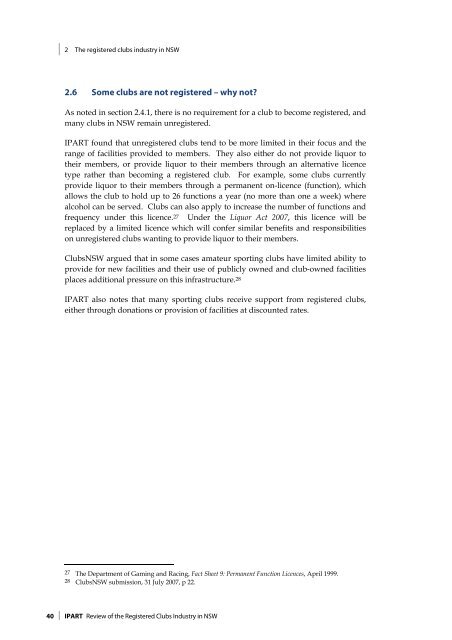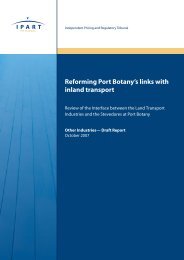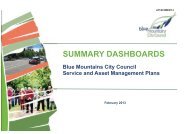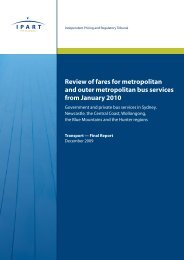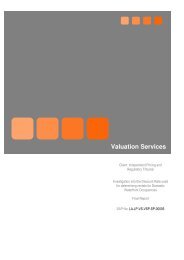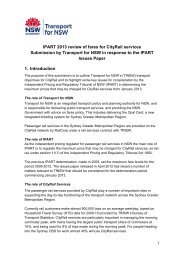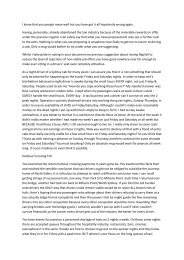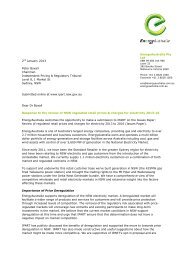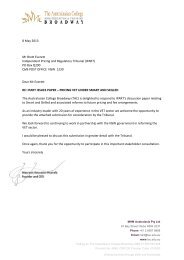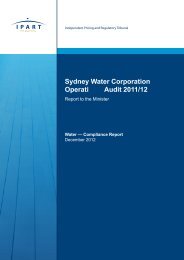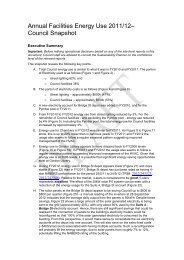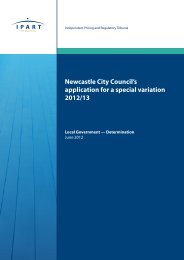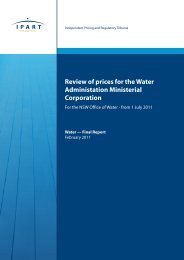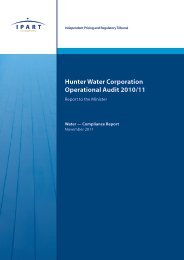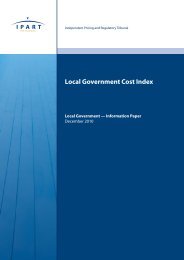- Page 1: Independent Pricing and Regulatory
- Page 4 and 5: © Independent Pricing and Regulato
- Page 6 and 7: Contents 6 Strengthening the financ
- Page 9 and 10: Executive Summary Executive Summary
- Page 11 and 12: Executive Summary estimated the val
- Page 13 and 14: Executive Summary Therefore, IPART
- Page 15 and 16: Executive Summary However, IPART al
- Page 17 and 18: Executive Summary List of Recommend
- Page 19 and 20: Executive Summary 15 Once the stand
- Page 21 and 22: Executive Summary 29 That ClubsNSW
- Page 23 and 24: Executive Summary 46 That ClubsNSW
- Page 25 and 26: Executive Summary 60 That OLGR deve
- Page 27 and 28: 1 Introduction 1 Introduction Over
- Page 29 and 30: 1 Introduction 1.1.2 Review’s foc
- Page 31 and 32: 1 Introduction 1.2 Other reviews an
- Page 33 and 34: 1 Introduction 1.3 The structure of
- Page 35 and 36: 2 The registered clubs industry in
- Page 37 and 38: 2 The registered clubs industry in
- Page 39 and 40: 2 The registered clubs industry in
- Page 41 and 42: 2 The registered clubs industry in
- Page 43 and 44: 2 The registered clubs industry in
- Page 45 and 46: 2 The registered clubs industry in
- Page 47: 2 The registered clubs industry in
- Page 51 and 52: 3 Understanding the social contribu
- Page 53 and 54: 3 Understanding the social contribu
- Page 55 and 56: 3 Understanding the social contribu
- Page 57 and 58: 3 Understanding the social contribu
- Page 59 and 60: 3 Understanding the social contribu
- Page 61 and 62: 3 Understanding the social contribu
- Page 63 and 64: 3 Understanding the social contribu
- Page 65 and 66: 3 Understanding the social contribu
- Page 67 and 68: 3 Understanding the social contribu
- Page 69 and 70: 3 Understanding the social contribu
- Page 71 and 72: 3 Understanding the social contribu
- Page 73 and 74: 3 Understanding the social contribu
- Page 75 and 76: 3 Understanding the social contribu
- Page 77 and 78: 4 Measuring and reporting on club c
- Page 79 and 80: 4 Measuring and reporting on club c
- Page 81 and 82: 4 Measuring and reporting on club c
- Page 83 and 84: 4 Measuring and reporting on club c
- Page 85 and 86: 4 Measuring and reporting on club c
- Page 87 and 88: 5 Refining the Community Developmen
- Page 89 and 90: 5 Refining the Community Developmen
- Page 91 and 92: 5 Refining the Community Developmen
- Page 93 and 94: 5 Refining the Community Developmen
- Page 95 and 96: 6 Strengthening the financial viabi
- Page 97 and 98: 6 Strengthening the financial viabi
- Page 99 and 100:
6 Strengthening the financial viabi
- Page 101 and 102:
6 Strengthening the financial viabi
- Page 103 and 104:
6 Strengthening the financial viabi
- Page 105 and 106:
6 Strengthening the financial viabi
- Page 107 and 108:
6 Strengthening the financial viabi
- Page 109 and 110:
6 Strengthening the financial viabi
- Page 111 and 112:
6 Strengthening the financial viabi
- Page 113 and 114:
6 Strengthening the financial viabi
- Page 115 and 116:
6 Strengthening the financial viabi
- Page 117 and 118:
7 Improving clubs’ financial repo
- Page 119 and 120:
7 Improving clubs’ financial repo
- Page 121 and 122:
7 Improving clubs’ financial repo
- Page 123 and 124:
7 Improving clubs’ financial repo
- Page 125 and 126:
7 Improving clubs’ financial repo
- Page 127 and 128:
7 Improving clubs’ financial repo
- Page 129 and 130:
7 Improving clubs’ financial repo
- Page 131 and 132:
7 Improving clubs’ financial repo
- Page 133 and 134:
7 Improving clubs’ financial repo
- Page 135 and 136:
8 Establishing a Club Viability Pan
- Page 137 and 138:
8 Establishing a Club Viability Pan
- Page 139 and 140:
8 Establishing a Club Viability Pan
- Page 141 and 142:
8 Establishing a Club Viability Pan
- Page 143 and 144:
8 Establishing a Club Viability Pan
- Page 145 and 146:
8 Establishing a Club Viability Pan
- Page 147 and 148:
8 Establishing a Club Viability Pan
- Page 149 and 150:
9 Improving corporate governance Th
- Page 151 and 152:
9 Improving corporate governance 9.
- Page 153 and 154:
9 Improving corporate governance Bo
- Page 155 and 156:
9 Improving corporate governance Bo
- Page 157 and 158:
9 Improving corporate governance Bo
- Page 159 and 160:
9 Improving corporate governance wh
- Page 161 and 162:
9 Improving corporate governance Ne
- Page 163 and 164:
9 Improving corporate governance IP
- Page 165 and 166:
9 Improving corporate governance Ch
- Page 167 and 168:
9 Improving corporate governance es
- Page 169 and 170:
9 Improving corporate governance Re
- Page 171 and 172:
9 Improving corporate governance 9.
- Page 173 and 174:
10 Helping clubs better understand
- Page 175 and 176:
10 Helping clubs better understand
- Page 177 and 178:
10 Helping clubs better understand
- Page 179 and 180:
10 Helping clubs better understand
- Page 181 and 182:
10 Helping clubs better understand
- Page 183 and 184:
11 Making it easier for clubs to am
- Page 185 and 186:
11 Making it easier for clubs to am
- Page 187 and 188:
11 Making it easier for clubs to am
- Page 189 and 190:
11 Making it easier for clubs to am
- Page 191 and 192:
11 Making it easier for clubs to am
- Page 193 and 194:
11 Making it easier for clubs to am
- Page 195 and 196:
11 Making it easier for clubs to am
- Page 197 and 198:
11 Making it easier for clubs to am
- Page 199 and 200:
11 Making it easier for clubs to am
- Page 201 and 202:
11 Making it easier for clubs to am
- Page 203 and 204:
11 Making it easier for clubs to am
- Page 205 and 206:
12 Making it easier for new clubs t
- Page 207 and 208:
12 Making it easier for new clubs t
- Page 209 and 210:
12 Making it easier for new clubs t
- Page 211 and 212:
12 Making it easier for new clubs t
- Page 213 and 214:
12 Making it easier for new clubs t
- Page 215 and 216:
13 Removing unnecessary regulatory
- Page 217 and 218:
13 Removing unnecessary regulatory
- Page 219 and 220:
13 Removing unnecessary regulatory
- Page 221 and 222:
14 A framework for a management pla
- Page 223 and 224:
14 A framework for a management pla
- Page 225:
14 A framework for a management pla
- Page 229 and 230:
A Terms of reference A Terms of ref
- Page 231 and 232:
A Terms of reference The proc
- Page 233 and 234:
B Terms of reference checklist Term
- Page 235 and 236:
C List of submitters, roundtable pa
- Page 237 and 238:
C List of submitters, roundtable pa
- Page 239 and 240:
C List of submitters, roundtable pa
- Page 241 and 242:
D Gambling expenditure and problem
- Page 243 and 244:
D Gambling expenditure and problem
- Page 245 and 246:
D Gambling expenditure and problem
- Page 247 and 248:
E IPART’s methodology for recordi
- Page 249 and 250:
E IPART’s methodology for recordi
- Page 251 and 252:
E IPART’s methodology for recordi
- Page 253 and 254:
E IPART’s methodology for recordi
- Page 255 and 256:
F ACG’s approach to measuring the
- Page 257 and 258:
F ACG’s approach to measuring the
- Page 259 and 260:
F ACG’s approach to measuring the
- Page 261 and 262:
G ClubsNSW - steps to establishing
- Page 263 and 264:
G ClubsNSW - steps to establishing
- Page 265 and 266:
Glossary and Abbreviations Glossary


